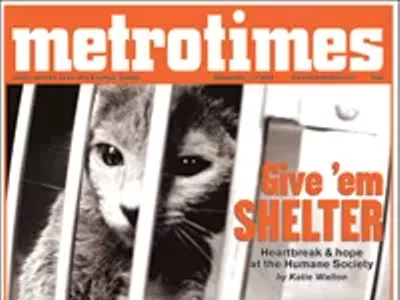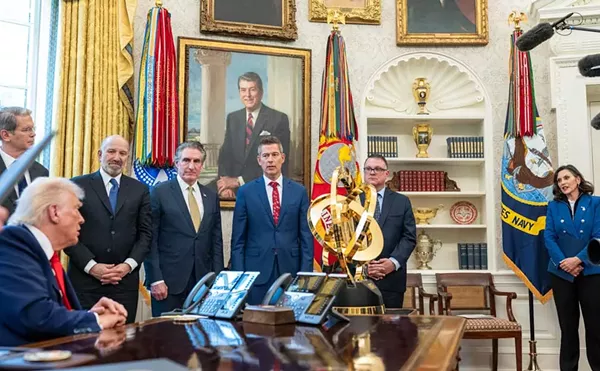
Audio By Carbonatix
[
{
"name": "GPT - Leaderboard - Inline - Content",
"component": "35519556",
"insertPoint": "5th",
"startingPoint": "3",
"requiredCountToDisplay": "3",
"maxInsertions": 100,
"adList": [
{
"adPreset": "LeaderboardInline"
}
]
}
]
Sitting behind the wheel of his Dodge Shadow, Roland Crosby points out a young man with sagging shorts leaning into the window of a black SUV that has rolled to a stop in the Barton-McFarlane neighborhood on Detroit’s West Side.
Money is exchanged. Crosby, a 67-year-old retiree who speaks in a slow, measured voice, suspects a small-time marijuana deal is going down, the kind of petty crime he has witnessed more times than he can count during the 14 years he’s been keeping a close eye on his neighborhood as part of a citizens radio patrol.
Crosby makes note of the incident; if he can compile more information about the suspected dealer, he will alert the police.
Since 1964, the citizens radio patrol has worked to keep the Barton-McFarlane community and its 18,000 residents — bound by Plymouth Road, Tireman Street, and railroad tracks running behind Roselawn Street and Schaefer Highway — as safe as possible.
The patrol’s 32 members hit the streets one day a week, once in the morning, again in the evening. Crosby says they patrolled more during the 1980s and 1990s, but the number of active volunteers has since decreased.
Even so, the patrols have an effect, says Sgt. Vanessa Wyatt, a 14-year Detroit Police veteran who works at the 2nd Precinct, which includes Barton-McFarlane.
“They inform you of everything they are aware of,” Wyatt says, “from abandoned cars, to drag racing, to streetlights out. … They’re out there, and a guy breaking into a house doesn’t like to be seen.”
Wyatt, who has worked at four Detroit precincts in her career, says tips from the Barton-McFarlane group have headed off potentially violent situations like home invasions and robberies.
But a healthy patrol doesn’t immunize a neighborhood from violence. The neighborhood has its share of rough sections.
According to Crosby, the Tireman-Joy sector is the most stable, and the area from Joy to Chicago is nice, but a lower-income neighborhood. The stretch between Chicago and Plymouth, however, he nicknames “Fort Apache, the Bronx,” after the movie.
“They have prostitutes that solicit men over there,” he says, “even when they are coming out of church.”
Crosby will never forget a rash of incidents that reminded him what makes the patrol critical to the well-being of his neighborhood. Two years ago, a young man who lived down the street from his Northlawn home took a girl to his senior prom. The girl liked the teenager, a rapper who’d been offered a contract by a major record company. Her boyfriend didn’t like him. Infuriated, he confronted the young man upon return from the prom, and shot him to death.
“His parents were sitting right there, looking out the window when it happened,” Crosby says.
There was also a parolee who returned to the neighborhood and began recruiting boys to commit robberies. When a group of them carjacked a state trooper, a merchant in the area who knew the gunman’s identity tipped the citizens patrol, who told the police.
The gunman was arrested several days later.
Wyatt credits the Barton-McFarlane Neighborhood Association’s network of 25 active block clubs, and the citizens radio patrol, its backbone, with making area cops’ jobs easier.
According to the Uniform Crime Report, there were more than 800 shootings in Detroit in the first six months of this year, a pace that could make this year top the 1,032 total shootings that occurred in 2003. Neighborhoods similar in makeup to Barton-McFarlane were some of the hardest-hit areas. Its median household income is $27,497, somewhat below the city-wide median of $29,526.
Residents feel that, without communication between neighbors and city officials, and a vigilant attitude, things would be even worse in their neighborhood.
“We are not bombarded with shootings,” says Theo Broughton, a Barton-McFarlane resident and longtime local activist. “We have extremely effective block clubs, which have phone and relay systems, and a list of homeowner phone numbers.”
Crosby leads the patrol, which, along with 33 others throughout the city, is funded by the Detroit City Clerk’s office.
He likens himself and Broughton to other longtime residents who believe citizens should detect and report unlawful activity before it grows out of control.
Sitting in his office in the Joy Road facility, Crosby displays a framed note written by one of his four daughters, an attorney, prior to her wedding. It reads, “You didn’t always speak with affectionate words, but your actions spoke volumes about your love for us.” He says his neighbors act the same way he does.
Organized effort
Prior to the weekly patrol, members gather and assign routes using a map of the neighborhood divided into areas. They always ride two to a car, and drive set patterns on side streets from one thoroughfare to another.
One person mans a base radio at the association office, and all devices tune into a frequency that can be picked up by officers at the 2nd Precinct. They also keep in contact with the Midwest Citizens Patrol, a neighboring group that monitors the area from Greenlawn Street to Livernois Road.
Crosby says the biggest issues are drugs, prostitution and abandoned vehicles.
Criminals in the area are very smart, he says, and suggests that a reporter riding along watch for young men playing street basketball on portable hoops. Drug dealers often use them to appear innocent, and then sell drugs to customers who drive by.
Abandoned cars rank high on their list of priorities. Rodents take residence under the hoods of idle vehicles.
He writes down the license plate of an Oldsmobile 98 that has been sitting unattended for weeks. In two days, he will call Metro Times to confirm that the vehicle has been towed.
Prostitution is harder to catch, because many women work out of their homes. The corner of Plymouth Road and Meyers Street is a known hub of activity. Some of the women even solicit men as they leave the Third New Hope Baptist church, just a few blocks away.
Using his radio — a 13-year-old General Electric device that operates on a UHF frequency — to alert other patrollers of a traffic light that is out at the Plymouth-Meyers intersection, Crosby stresses that they always refer to each other in code when patrolling. Everyone has a unit number that becomes his or her name for the duration of a patrol. They never know who might be listening in.
Larry Tomic, who helps coordinate the patrols for the City Clerk’s office, says a patrol disliked by wrongdoers is a successful one.
The clerk’s office spends about $250,000 a year to train and support patrols in 34 neighborhoods scattered across Detroit. Most operate similarly to Barton-McFarlane’s, and the city could clearly use more patrollers in more neighborhoods.
Crosby considers them a good investment on the city’s part.
“If you’re the one riding around your own neighborhood, you’ve got a vested interest,” he says. “How do I know the neighborhood better than you? How do I know whether you’ve got a prostitution or a dumping issue?”
The clerk registers each patrol as a nonprofit organization through the State of Michigan. Participants volunteer, and the city reimburses them for supplies such as T-shirts, hats, ID badges and mileage.
Patrollers say more help is needed.
Equipment problems are common.
With his radio breaking up when he approaches the west end of the neighborhood, Crosby says patrollers have complained to the city about the quality of their equipment.
“We need to be able to communicate,” he says.
The association’s been talking with the city. Cell phones, or something like that, he says, are an option that has been discussed.
The city says patrollers only need better antennas.
Aside from the equipment issue, an aging group of volunteers seeing few young recruits is also a concern.
“You know that old saying, ‘It takes a village to raise a child’?” says Roland Bennett, 83, who has been on the patrol more than 20 years, “Well, it takes an entire community to keep things going!” Crosby agrees, albeit diplomatically. Ten years ago, he notes, there were three patrol days a week, because more people were involved.
“But times change,” he says. “I understand that. Young people have jobs, families. Even I didn’t get involved until I retired. So we have to keep it going.”
He says the challenges are outweighed by the occasional confirmation that their work is paying off.
One of the strongest endorsements of their efforts came from a reformed criminal who Crosby says visited a Barton-McFarlane patrol meeting.
“The question was asked, ‘What did you fear most when committing your crimes,’” Crosby says, “‘police, dogs or guns?’ He said, ‘None of the above. If I saw a block club sign, I didn’t mess with that street.’”
Khary Kimani Turner is a Metro Times staff writer. E-mail kturner@metrotimes.com




